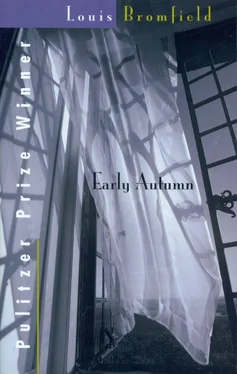Луис Бромфилд - Early Autumn - A Story of a Lady
Здесь есть возможность читать онлайн «Луис Бромфилд - Early Autumn - A Story of a Lady» весь текст электронной книги совершенно бесплатно (целиком полную версию без сокращений). В некоторых случаях можно слушать аудио, скачать через торрент в формате fb2 и присутствует краткое содержание. Год выпуска: 2014, ISBN: 2014, Издательство: The Wooster Book Company, Жанр: Проза, на английском языке. Описание произведения, (предисловие) а так же отзывы посетителей доступны на портале библиотеки ЛибКат.
- Название:Early Autumn: A Story of a Lady
- Автор:
- Издательство:The Wooster Book Company
- Жанр:
- Год:2014
- ISBN:978-1-59098-820-6
- Рейтинг книги:3 / 5. Голосов: 1
-
Избранное:Добавить в избранное
- Отзывы:
-
Ваша оценка:
- 60
- 1
- 2
- 3
- 4
- 5
Early Autumn: A Story of a Lady: краткое содержание, описание и аннотация
Предлагаем к чтению аннотацию, описание, краткое содержание или предисловие (зависит от того, что написал сам автор книги «Early Autumn: A Story of a Lady»). Если вы не нашли необходимую информацию о книге — напишите в комментариях, мы постараемся отыскать её.
Early Autumn: A Story of a Lady — читать онлайн бесплатно полную книгу (весь текст) целиком
Ниже представлен текст книги, разбитый по страницам. Система сохранения места последней прочитанной страницы, позволяет с удобством читать онлайн бесплатно книгу «Early Autumn: A Story of a Lady», без необходимости каждый раз заново искать на чём Вы остановились. Поставьте закладку, и сможете в любой момент перейти на страницу, на которой закончили чтение.
Интервал:
Закладка:
He understood the game perfectly and made no mistakes, for he had had the best of all training—that of knowing all sorts of people in all sorts of conditions. In himself, he embodied them all, if the simple and wholly kindly and honest were omitted; for he was really not a simple man nor a wholly honest one and he was too ruthless to be kindly. He understood people (as Sabine had guessed), with their little prides and vanities and failings and ambitions.
Aunt Cassie and Anson in the rigidity of their minds had been unjust in thinking that their world was the goal of his ambitions. They had, in the way of those who depend on their environment as a justification for their own existence, placed upon it a value out of all proportion in the case of a man like O’Hara. To them it was everything, the ultimate to be sought on this earth, and so they supposed it must seem to O’Hara. It would have been impossible for them to believe that he considered it only as a small part of his large scheme of life and laid siege to it principally for the pleasure that he found in the battle; for it was true that O’Hara, once he had won, would not know what to do with the fruits of his victory.
Already he himself had begun to see this. He had begun to understand that the victory was so easy that the battle held little savor for him. Moments of satisfaction such as that which had overtaken him as he sat talking to Sabine were growing more and more rare … moments when he would stop and think, “Here am I, Michael O’Hara, a nobody … son of a laborer and a housemaid, settled in the midst of such a world as Durham, talking to such a woman as Mrs. Richard Callendar.”
No, the savor was beginning to fail, to go out of the struggle. He was beginning to be bored, and as he grew bored he grew also restless and unhappy.
Born in the Roman Catholic church, he was really neither a very religious nor a very superstitious man. He was skeptic enough not to believe all the faiths the church sought to impose upon him, yet he was not skeptic enough to find peace of mind in an artificial will to believe. For so long a time he had relied wholly upon himself that the idea of leaning for support, even in lonely, restless moments, upon a God or a church, never even occurred to him. He remained outwardly a Roman Catholic because by denying the faith he would have incurred the enmity of the church and many thousands of devout Irish and Italians. The problem simply did not concern him deeply one way or the other.
And so he had come, guided for the moment by no very strong passion, into the doldrums of confusion and boredom. Even his fellow-politicians in Boston saw the change in him and complained that he displayed no very great interest in the campaign to send him to Congress. He behaved at times as if it made not the slightest difference to him whether he was elected to Congress or not … he, this Michael O’Hara who was so valuable to his party, so engaging and shrewd, who could win for it almost anything he chose.
And though he took care that no one should divine it, this strange state of mind troubled him more deeply than any of his friends. He was assailed by the certainty that there was something lacking from his life, something very close to the foundations. Now that he was inactive and bored, he had begun to think of himself for the first time. The fine, glorious burst of first youth, when everything seemed part of a splendid game, was over and done now, and he felt himself slipping away toward the borderland of middle age. Because he was a man of energy and passion, who loved life, he felt the change with a keen sense of sadness. There was a kind of horror for him in the idea of a lowered tempo of life—a fear that filled him at times with a passionately satisfactory sort of Gaelic melancholy.
In such moments, he had quite honestly taken stock of all he possessed, and found the amassed result bitterly unsatisfactory. He had a good enough record. He was decidedly more honorable than most men in such a dirty business as politics—indeed, far more honorable and freer from spites and nastinesses than many of those who had come out of this very sacred Durham world. He had made enough money in the course of his career, and he was winning his battle in Durham. Yet at thirty-five life had begun to slacken, to lose some of that zest which once had led him to rise every morning bursting with animal spirits, his brain all a-glitter with fascinating schemes.
And then, in the very midst of this perilous state of mind, he discovered one morning that the old sensation of delight at rising had returned to him, only it was not because his brain was filled with fascinating schemes. He arose with an interest in life because he knew that in a little while he would see Olivia Pentland. He arose, eager to fling himself on his horse and, riding across the meadows, to wait by the abandoned gravel pit until he saw her coming over the dew-covered fields, radiant, it seemed to him, as the morning itself. On the days when she did not come it was as if the bottom had dropped out of his whole existence.
It was not that he was a man encountering the idea of woman for the first time. There had been women in his life always, since the very first bedraggled Italian girl he had met as a boy among the piles of lumber along the wharves. There had been women always because it was impossible for a man so vigorous and full of zest, so ruthless and so scornful, to have lived thirty-five years without them, and because he was an attractive man, filled when he chose to be, with guile and charm, whom women found it difficult to resist. There had been plenty of women, kept always in the background, treated as a necessity and prevented skillfully from interfering with the more important business of making a career.
But with Olivia Pentland, something new and disturbing had happened to him … something which, in his eagerness to encompass all life and experience, possessed an overwhelming sensuous fascination. She was not simply another woman in a procession of considerable length. Olivia Pentland, he found, was different from any of the others … a woman of maturity, poised, beautiful, charming and intelligent, and besides all these things she possessed for him a kind of fresh and iridescent bloom, the same freshness, only a little saddened, that touched her young daughter.
In the beginning, when they had talked together while she planned the garden at Brook Cottage, he had found himself watching her, lost in a kind of wonder, so that he scarcely understood what she was saying. And all the while he kept thinking, “Here is a wonderful woman … the most wonderful I’ve ever seen or will ever see again … a woman who could make life a different affair for me, who would make of love something which people say it is.”
She had affected him thus in a way that swept aside all the vulgar and cynical coarseness with which a man of such experience is likely to invest the whole idea of woman. Until now women had seemed to him made to entertain men or to provide children for them, and now he saw that there was, after all, something in this sentiment with which people surrounded a love affair. For a long time he searched for a word to describe Olivia and in the end he fell back upon the old well-worn one which she always brought to mind. She was a “lady”—and as such she had an overwhelming effect upon his imagination.
He had said to himself that here was a woman who could understand him, not in the aloof, analytical fashion of a clever woman like Sabine Callendar, but in quite another way. She was a woman to whom he could say, “I am thus and so. My life has been of this kind. My motives are of this sort,” and she would understand, the bad with the good. She would be the one person in the world to whom he could pour out the whole burden of secrets, the one woman who could ever destroy the weary sense of loneliness which sometimes afflicted him. She made him feel that, for all his shrewdness and hard-headed scheming, she was far wiser than he would ever be, that in a way he was a small boy who might come to her and, burying his head in her lap, have her stroke his thick black hair. She would understand that there were times when a man wanted to be treated thus. In her quiet way she was a strong woman, unselfish, too, who did not feed upon flattery and perpetual attention, the sort of woman who is precious to a man bent upon a career. The thought of her filled him with a poignant feeling of sadness, but in his less romantic moments he saw, too, that she held the power of catching him up out of his growing boredom. She would be of great value to him.
Читать дальшеИнтервал:
Закладка:
Похожие книги на «Early Autumn: A Story of a Lady»
Представляем Вашему вниманию похожие книги на «Early Autumn: A Story of a Lady» списком для выбора. Мы отобрали схожую по названию и смыслу литературу в надежде предоставить читателям больше вариантов отыскать новые, интересные, ещё непрочитанные произведения.
Обсуждение, отзывы о книге «Early Autumn: A Story of a Lady» и просто собственные мнения читателей. Оставьте ваши комментарии, напишите, что Вы думаете о произведении, его смысле или главных героях. Укажите что конкретно понравилось, а что нет, и почему Вы так считаете.












